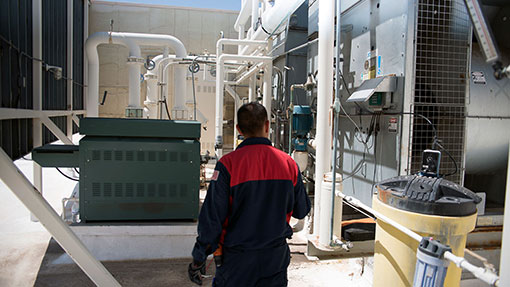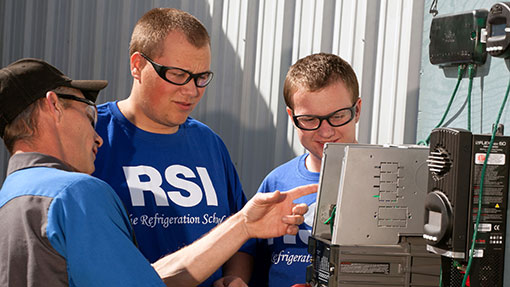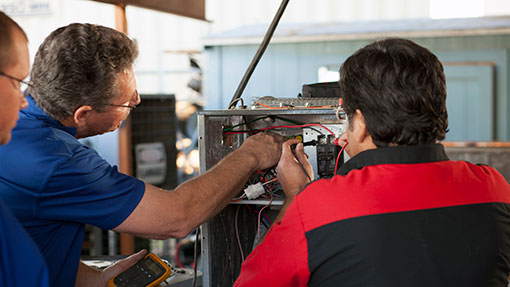Electrical Applications (Electrician Training Program)
Duration: 7 Months
RSI is the right choice
HVAC/R Training Since 1965
94%³
Overall Employment Rate
Across All RSI Campus Locations
Largest HVAC/R School in the USA*
Upcoming Class Start Dates
| Class | Location | Date |
|---|---|---|
| Classes Start | Phoenix, AZ | 05/17/2024 |
| Classes Start | Phoenix, AZ | 06/17/2024 |
Class Schedules (Monday-Friday)
| Morning | Afternoon | Evening |
|---|---|---|
| 7:00am-12:15pm | 12:45pm-5:45pm | 6:00pm-11:00pm |
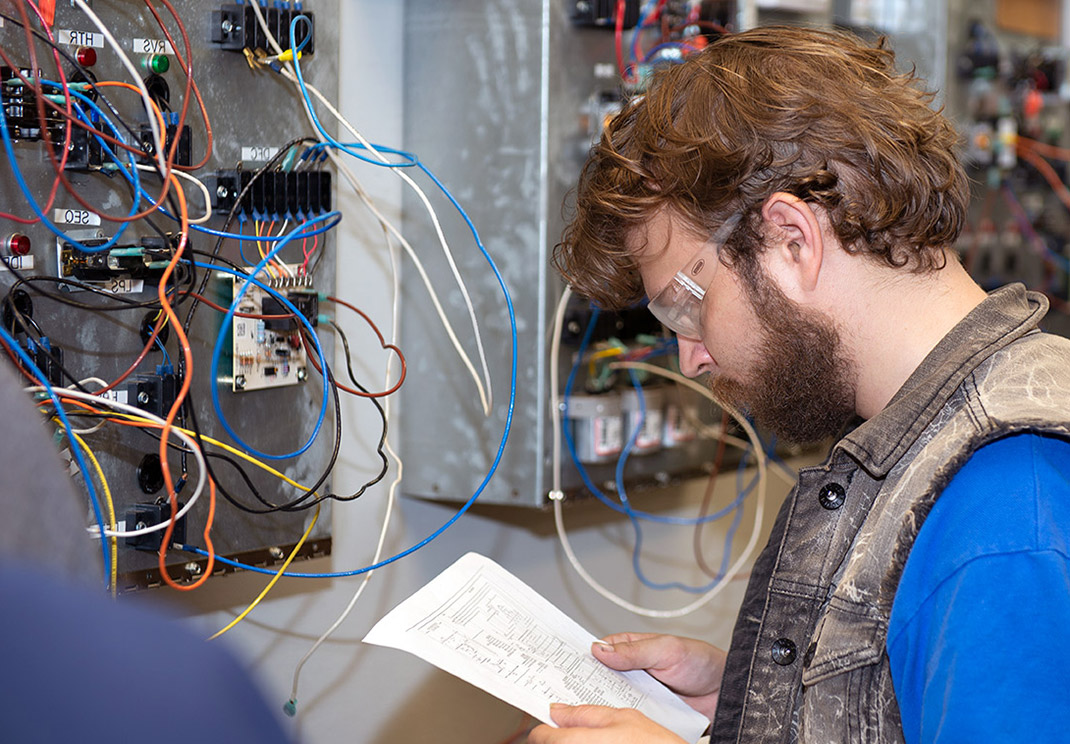
The Electrical Applications program at RSI trains students in the fundamentals of the following:
- Mechanical and electrical principles
- Residential and commercial wiring applications
- Voice, video and data cabling systems
- The application on motors, lighting, devices and various types of transformers
Students will receive a Diploma after successfully completing this program.
Learn the Skills You Need to Become an Electrician
In as little as 7 months, you’ll be trained with the skills necessary to enter the electrical industry as an electrician. Here are some of the career opportunities that await you:
- Residential Electrician
- Commercial Electrician
- Industrial Electrician
- Maintenance Electrician
Employment is Expected to Grow for Electricians in the US by 79,900 Jobs by 2031!i
Electrician Salaries
The nationwide employment for electricians is expected to grow by 7% from 2021 to 2031.i In particular, Arizona is projecting a 35% increase for the employment of electricians from 2020 to 2030.i
Request More Info
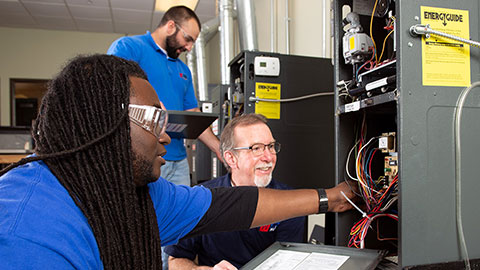
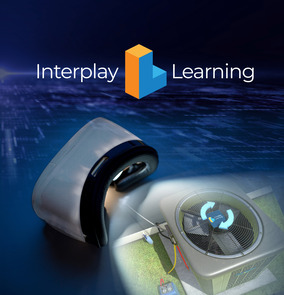
Students Get a Meta Quest 2 loaded with Access to Interplay Virtual Reality Training!
Train anywhere. Anytime.
Students of the Electrical Applications program will have the Interplay Learning virtual reality training simulator available to enhance skills learned. Interplay simulates the experience of Electrical, HVAC training via VR to help students learn trouble-shooting techniques, even when they’re away from school. A Meta Quest 2 is part of the gear package for this program and Interplay Learning is included as part of the course materials for all students.
Program Courses
Fundamentals of Electricity
This HVAC/R class provides The Refrigeration School students with basic electrical understanding from an elemental stage through troubleshooting. Trainers are used to teach schematic wiring as well as test meter usage along with all the safety processes associated with handling electrical systems such as grounding and energized circuits. Students will work with dual voltage systems commonly found in HVAC/R equipment.
The foundation for control circuit wiring and high voltage wiring are discussed and students will put their knowledge to use while working with the trainers. The training material in this HVAC/R class includes information on multiple types of test meters and their proper use, electrical devices, control devices, and troubleshooting. A study of single phase and three phase motors round out the students’ understanding of basic electrical principles.
HVE100
- 4 Semester Credit Hours
- 90 Lecture Hours
- 10 Lab Hours
- 100 Total Contact Hours
- 14.5 Outside Prep Hours
Fundamentals of Solar
This module provides an overview of photovoltaic (PV) science and an introduction to the fundamentals of solar energy. Through a combination of lecture, problem solving and hands-on lab exercises, students will learn the concepts and processes of photovoltaic systems, including their design and installation. The module covers the scope of solar energy systems’ conceptual, mechanical and electrical design, with an emphasis on wiring and electrical issues.
HVE110
- 4 Semester Credit Hours
- 60 Lecture Hours
- 40 Lab Hours
- 100 Total Contact Hours
- 9.5 Outside Prep Hours
Electrical Wiring – Residential
This course introduces the most current version of the National Electrical Code Book to the students as a guide throughout the class. The primary goal of the program is to teach basic techniques of Residential wiring from the standpoint of interpreting all code book requirements. Students will put into practice all that they have learned by wiring a scaled down three bedroom home. A study of electrical safety is provided to ensure a complete understanding of hand tools, ladders, shock hazards, and the personal protective equipment required to work in this field. They will be required to safely place all wiring, circuits, switches, receptacles, lighting fixtures, and GFCI devices in the trainer according to the electrical code.
HVE120
- Prerequisite Course(s): HVE100
- 4 Semester Credit Hours
- 60 Lecture Hours
- 40 Lab Hours
- 100 Total Contact Hours
- 15 Outside Prep Hours
Electrical Wiring – Commercial
The Commercial wiring course follows through with concepts learned in the Residential wiring course of training delving deeper into the National Electrical Code book. Students will be tasked with code book interpretation through the study of load calculations, blue print reading, cost estimating, three phase motor wiring, and conduit manipulation. Students will wire commercial lighting and three phase motors as they research the required applications. A mock commercial building will be wired by students in accordance with applicable code using conduit to protect their wiring.
HVE130
- Prerequisite Course(s): HVE100
- 4 Semester Credit Hours
- 60 Lecture Hours
- 40 Lab Hours
- 100 Total Contact Hours
- 20 Outside Prep Hours
Emerging Electrical Applications
This course follows through with the knowledge built in Electrical Wiring – Commercial with continued instruction in conduit bending up to 6” trade size using hydraulic bending equipment. This class explains the proper selection of pull boxes and junction boxes, the factors involved in conductor selection and calculations, the proper techniques for conductor installations, as well as the various applications necessary for conductor terminations and splices. Students will continue to advance in their ability to calculate load requirements for branch and feeder circuits in keeping with current standards of the National Electrical Code. This class will also introduce the installation of various voice, data, and video cabling systems.
HVE145
- Prerequisite Course(s): HVE100, HVE130
- 4 Semester Credit Hours
- 70 Lecture Hours
- 30 Lab Hours
- 100 Total Contact Hours
- 15 Outside Prep Hours
Motors and Lighting Practices
This class elaborates on the characteristics of Alternating Current, explaining the behavior of electricity and how it functions in the application of motors, lighting, and the devices that control them. Students will learn the differences between DC and AC motors, Single Phase and 3 Phase applications, calculating the proper sizing of motors, and the selection of the motor controller as well as overload protection. This class also covers the characteristics of light, the handling and installation of various types of lighting (incandescent, fluorescent, high intensity discharge, LED), and the controls used in their operation.
HVE150
- 4 Semester Credit Hours
- 60 Lecture Hours
- 40 Lab Hours
- 100 Total Contact Hours
- 15 Outside Prep Hours
Electrical Distribution Systems
This class will describe the operating characteristics of various types of transformers. Using the National Electrical Code, students will calculate transformer sizes for various applications. This module describes the purpose of switchgear, its construction, and maintenance. In this class, students will also understand the importance of overcurrent protection, describe the various types of fuses and circuit breakers in the industry, and select the proper size for specific applications. Students will also apply their knowledge of the proper methods for grounding and bonding according to the requirements of the NEC. This class describes the wiring methods for specific hazardous locations, and also introduces the installation of cable tray systems.
HVE160
- 4 Semester Credit Hours
- 60 Lecture Hours
- 40 Lab Hours
- 100 Total Contact Hours
- 15 Outside Prep Hours
Sound Interesting? Contact us for more information on the Electrical Applications Program.


